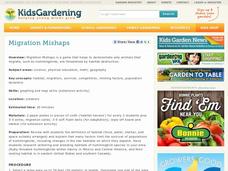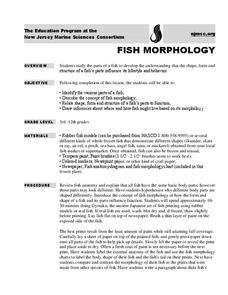National Gardening Association
Migration Mishaps
Elementary ecologists pretend to be migratory hummingbirds. They fly between wintering and nesting grounds, trying to reach a habitat haven. In a musical-chair fashion, some birds will miss out, and are removed from the game. To further...
Curated OER
Animal Habitats
Students research an animal and their habitat. In this animal habitat lesson, students observe a WebQuest that describes the different habitats: deserts, tundra, rainforest, forest, and ocean. They determine which habitat their animal...
Curated OER
African Savanna Habitat Diorama Craft
Set the stage for a unit or lesson on the African savanna by creating a cute habitat diorama. Cheetahs, lions, zebras, and elephants are all present in a shoe-box-sized craft that requires your learners to color, cut, and paste. These...
Staten Island Zoo
The African Savanna
Are you thinking about taking your class to the local zoo? Kids of all ages love visiting exotic animals in order to learn about biodiversity, habitat, and animal adaptations. Here is a 44-page activity guide that provides educators with...
Umaine Museum of Art
Bony Fish Anatomy Worksheet
Take time to appreciate the beauty in the anatomy of animals with this cross-curricular art and science activity. After viewing examples of fish-themed artwork, children complete the included worksheet by labeling the...
National Wildlife Federation
Habitat Web
Young scientists weave together an understanding of ecosystems with this fun collaborative activity. Taking on the roles of different living and non-living elements of specific habitats, learners use a ball of yarn to create...
Consortium for Ocean Science Exploration and Engagement (COSEE)
Fish Morphology
Life comes in all different shapes and sizes, and fish are no exception. Here, young scientists create fish prints as they learn how specific characteristics allow different species to survive in their particular habitats.
National Geographic
Rescuing, Relocating, and Rehabilitating Wildlife
Bring up the Deepwater Horizon (BP) oil spill that occurred in the Gulf of Mexico in 2010. Display the colorful diagram of the coastal and marine organisms living in the area. Show a video about relocating the eggs of the Gulf's sea...
Howard Hughes Medical Institute
Niche Partitioning Activity
Dinnertime on the African savanna is a highly choreographed event! Introduce young ecologists to the concept of niche partitioning through a hands-on activity. Pupils research animal behaviors and use data to develop an understanding of...
Howard Hughes Medical Institute
Scientific Inquiry Using WildCam Gorongosa
How do scientists determine what questions to ask to meet their research goals? Help your class develop an inquiry mindset with a lesson based on studies in the Gorongosa National Park. Partners create their own research questions by...
American Museum of Natural History
Endangered Species Game
Multiple factors affect the survival of endangered species. A hands-on activity has learners explore those factors. They play a board game that highlights factors such as human influence, habitat availability, and new species introduction.
SeaWorld
Design a Fish
Craft some neat refrigerator magnets while studying ocean animals with a lesson about the anatomy of a fish. After kids learn about the different parts and shapes of fish, they use modeling compound to design their own fish.
American Museum of Natural History
Calculating a Biodiversity Index
Biodiversity refers to the variety of animal and plant species in a specific habitat. With a collaborative activity, the habitat becomes a page from the white pages, and the species are the surnames in the book. Learners calculate the...
PBS
Reading Adventure Pack: Oceans
Flotsam by David Wiesner and The Magic School Bus on the Ocean Floor by Joanna Cole, illustrated by Bruce Degen, begin a reading adventure pack focusing on oceans. With story listening and thoughtful discussion, scholars complete several...
ARKive
Temperate Rainforest in the Pacific Northwest
Explore the amazing temperate rainforest of the Pacific Northwest. Your class starts by investigating the animals and plants of the Northwest, specifically Washington, and then research an animal population common to the area. In small...
Teach Engineering
Live Like an Animal
When your parents say that your room's a pig sty, tell them about biomimicry. The sixth installment of a nine-part Life Science unit has scholars research the shelters used by animals in the natural world, like turtle shells. Using the...















